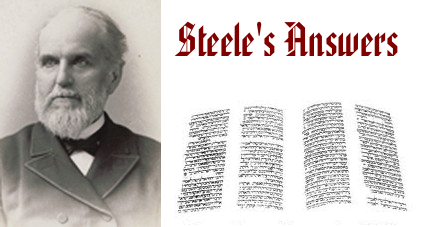"33 And the LORD spake unto Moses and unto Aaron, saying, 34 When ye be come into the land of Canaan, which I give to you for a possession, and I put the plague of leprosy in a house of the land of your possession; 35 And he that owneth the house shall come and tell the priest, saying, It seemeth to me there is as it were a plague in the house: 36 Then the priest shall command that they empty the house, before the priest go into it to see the plague, that all that is in the house be not made unclean: and afterward the priest shall go in to see the house: 37 And he shall look on the plague, and, behold, if the plague be in the walls of the house with hollow strakes, greenish or reddish, which in sight are lower than the wall; 38 Then the priest shall go out of the house to the door of the house, and shut up the house seven days: 39 And the priest shall come again the seventh day, and shall look: and, behold, if the plague be spread in the walls of the house; 40 Then the priest shall command that they take away the stones in which the plague is, and they shall cast them into an unclean place without the city: 41 And he shall cause the house to be scraped within round about, and they shall pour out the dust that they scrape off without the city into an unclean place: 42 And they shall take other stones, and put them in the place of those stones; and he shall take other morter, and shall plaister the house. 43 And if the plague come again, and break out in the house, after that he hath taken away the stones, and after he hath scraped the house, and after it is plaistered; 44 Then the priest shall come and look, and, behold, if the plague be spread in the house, it is a fretting leprosy in the house: it is unclean. 45 And he shall break down the house, the stones of it, and the timber thereof, and all the morter of the house; and he shall carry them forth out of the city into an unclean place. 46 Moreover he that goeth into the house all the while that it is shut up shall be unclean until the even. 47 And he that lieth in the house shall wash his clothes; and he that eateth in the house shall wash his clothes. 48 And if the priest shall come in, and look upon it, and, behold, the plague hath not spread in the house, after the house was plaistered: then the priest shall pronounce the house clean, because the plague is healed. 49 And he shall take to cleanse the house two birds, and cedar wood, and scarlet, and hyssop: 50 And he shall kill the one of the birds in an earthen vessel over running water: 51 And he shall take the cedar wood, and the hyssop, and the scarlet, and the living bird, and dip them in the blood of the slain bird, and in the running water, and sprinkle the house seven times: 52 And he shall cleanse the house with the blood of the bird, and with the running water, and with the living bird, and with the cedar wood, and with the hyssop, and with the scarlet: 53 But he shall let go the living bird out of the city into the open fields, and make an atonement for the house: and it shall be clean. 54 This is the law for all manner of plague of leprosy, and scall, 55 And for the leprosy of a garment, and of a house, 56 And for a rising, and for a scab, and for a bright spot: 57 To teach when it is unclean, and when it is clean: this is the law of leprosy." — Leviticus 14:33-57 KJV.

SIGNS OF LEPROSY IN A HOUSE, 33-45.
The nature of house leprosy is a great mystery. If it proceeded from a natural cause we should expect to find the same cause productive of a like effect in modern Palestine. But travellers report no instances. The most prevalent theory, having a slight scriptural basis (see verse 34, note) is, that it was a supernatural plague. This is the opinion of Patrick, Aberbanel, and many rabbins. The author of
Sepher Cosri says, “God inflicted the plague of leprosy upon houses and garments as a punishment for lesser sins, and when the parties continued to multiply transgressions, it invaded their bodies.” Maimonides specifies the sin of which this is the punishment to be an evil tongue. The Targum of Palestine says that the plague was because the house was “built by rapine.” Michaelis has suggested, as a natural cause, a nitrous efflorescence produced by saltpetre, or rather an acid containing it, and issuing in red spots. He cites the case of a house in Lubeck. But this does not counterbalance the absence of such phenomena in the Holy Land in modern times. Says Dr. W.M. Thomson, “I have suspected that this disease is caused by living and self-propagating animalculae; and thus I can conceive it possible that these might fasten on a wall, especially if the cement were mixed with sizing, as is now done, or other gelatinous or animal glues. Still, the most cursory reference to the best of medical works shows how little is known about the whole subject of contagion, and its propagation by
fomites. One finds in them abundant and incontestable instances of the propagation of many terrible constitutional maladies, in the most inexplicable manner, by garments, leather, wood, and other things, the
materies morbi meantime eluding the most persevering and vigilant search, aided by every appliance of modern science, chemical or optical.”






.png)


.png)






.png)


.png)



.png)

.png)
.png)
